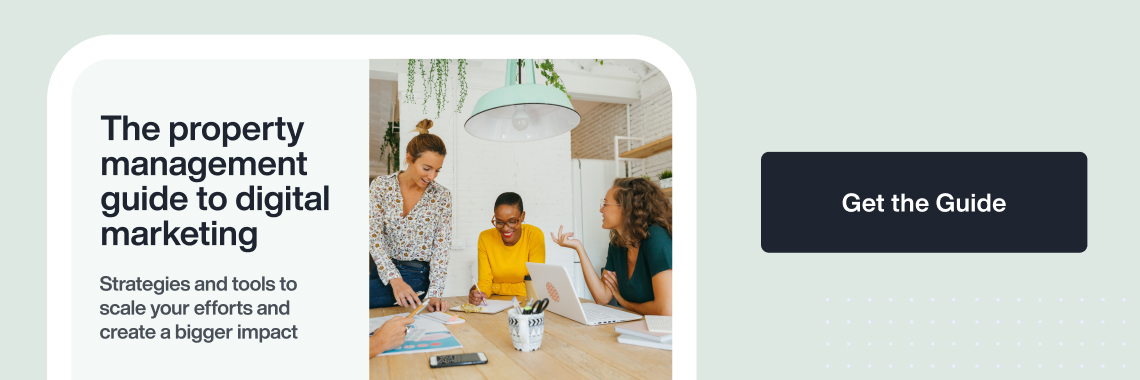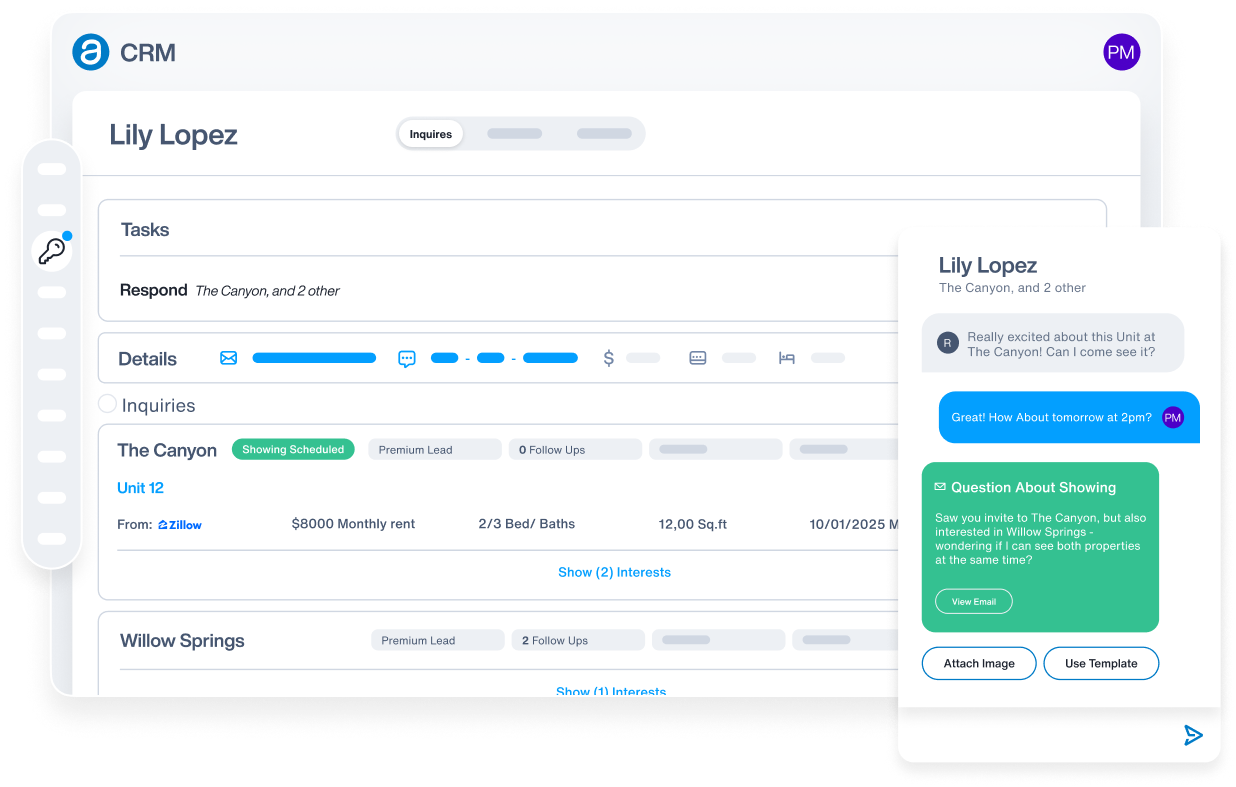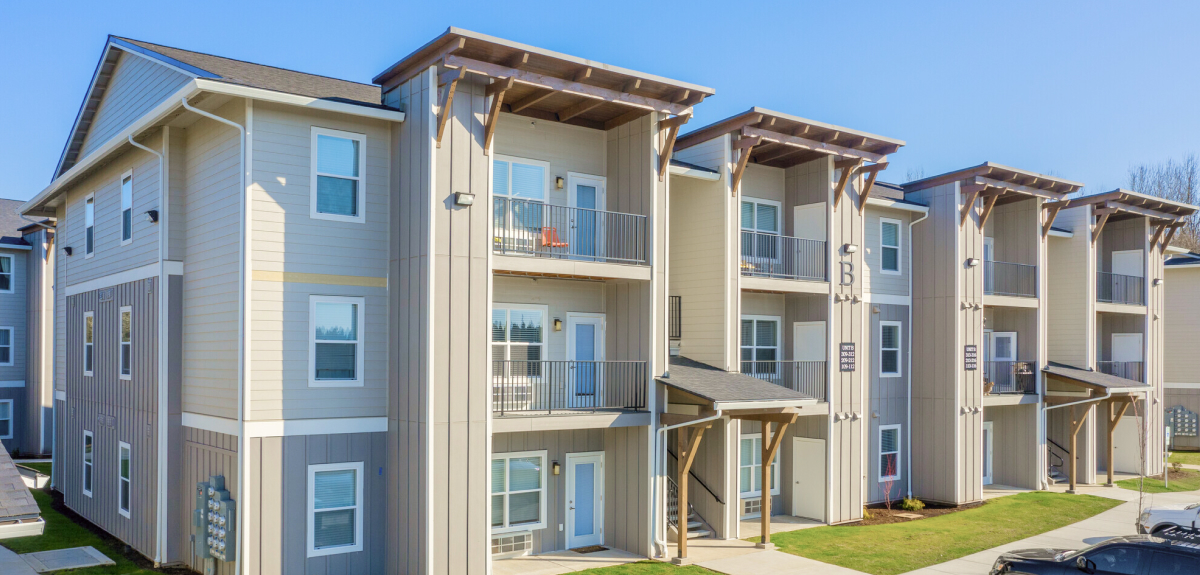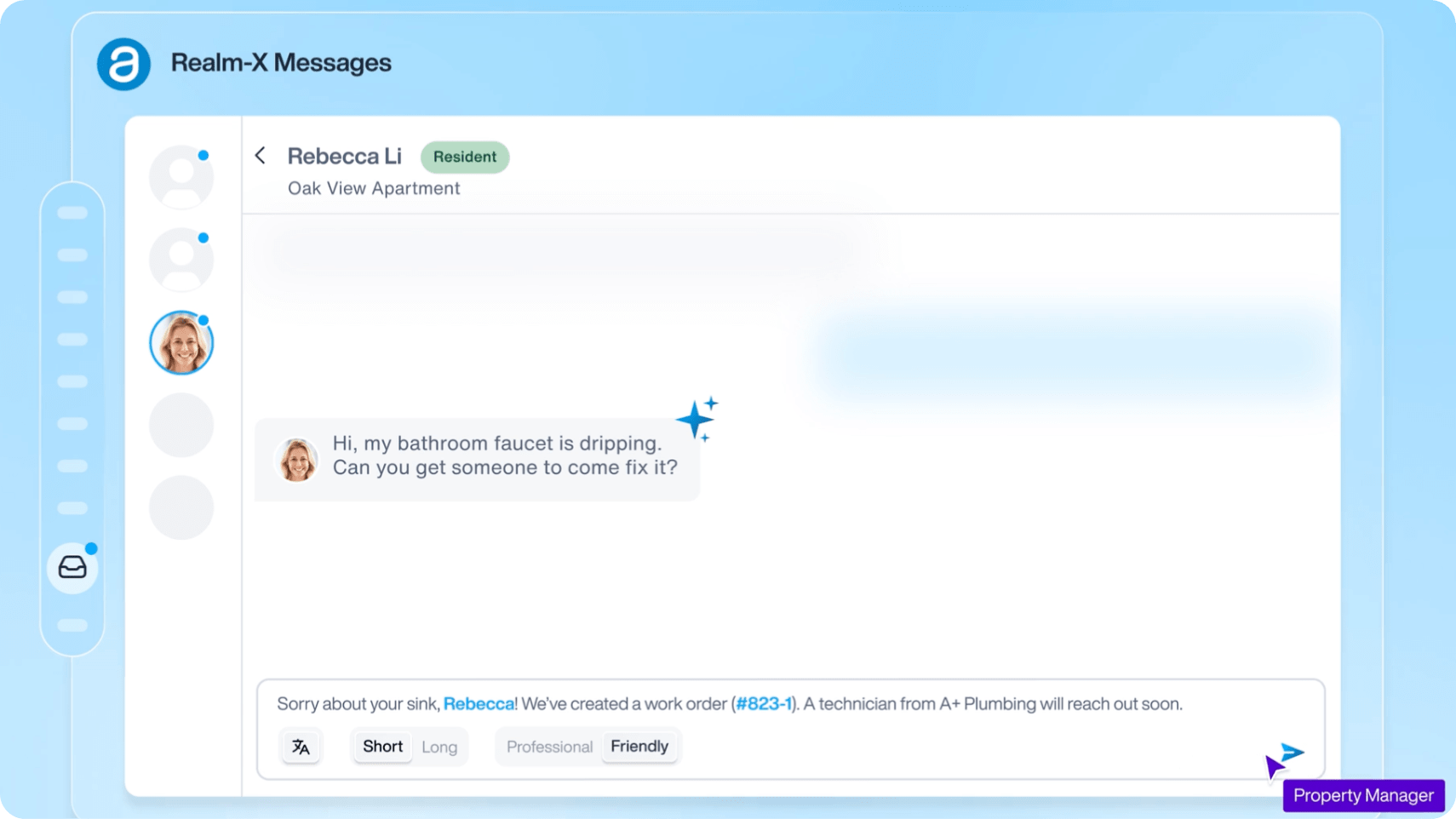Published on July 26th, 2022
By Megan Eales Monroe
In our first episode of season 3 of The Top Floor podcast, we speak with two experts about the world of CRM tools, property management, and AI.
Demetri Themelis, Co-Founder & CEO of Knock®, and Laura Rhoads, Staff Product Manager at AppFolio, are in agreement – CRM tools are a must-have for any property management company.
In their discussions with us, they shared the benefits of CRM tools for the business as a whole, the staff, and your residents, plus why changing renter expectations should influence your choice of CRM tools.
Meet Our Guests
 Demetri Themelis is the Co-Founder and CEO at Knock®, the leading performance management platform and CRM for multifamily property owners and managers. He strives to make Knock the most innovative, trusted and fun performance management platform in the multifamily industry, while helping the company achieve its mission of enabling successful communities through technology and customer service.
Demetri Themelis is the Co-Founder and CEO at Knock®, the leading performance management platform and CRM for multifamily property owners and managers. He strives to make Knock the most innovative, trusted and fun performance management platform in the multifamily industry, while helping the company achieve its mission of enabling successful communities through technology and customer service.
In his eight years at Knock, Demetri has led the company to win three start-up competitions and successfully raised $50M in funding – all while developing meaningful friendships along the way. Demetri appreciates that Knock allows him challenges that serve as growth opportunities, as well as the chance to contribute positively to the lives of both his customers and employees.
Prior to co-founding Knock, he worked in equity sales at UBS. He is also an avid skier, and has participated in the US Freeskiing Open, Slopestyle, Big Air, Halfpipe competitions. On his days off, Demetri enjoys flying kites, watching the Blue Angels perform, and hitting the slopes on a great powder day.
 Laura Rhoads is a Staff Product Manager at AppFolio. She works with development teams in the Leasing and Marketing space to deliver effective and thoughtful solutions for AppFolio customers.
Laura Rhoads is a Staff Product Manager at AppFolio. She works with development teams in the Leasing and Marketing space to deliver effective and thoughtful solutions for AppFolio customers.
Laura has been doing Product Management for over a decade and enjoys understanding the intricacies of how her customers run their daily operations.
When she’s not working, she enjoys hosting dinner parties and spending time at the beach with her family.
Listen Now
Episode Transcript
Megan: CRM, or customer relationship management is what ties many businesses together. And it’s a vital part of the rental housing industry. Not only does a good CRM strategy benefit your business, but it also benefits your team, and the renters they interact with. CRM technology is especially vital for marketing and leasing because it can set the tone for the entire resident experience.
Here to kick off the conversation today is Demetri Themelis, Co-Founder and CEO of Knock, a CRM and performance management platform for the multifamily industry, and an AppFolio stack integration partner.
Demetri Themelis: My name is Demetri Themelis, and I am one of the co-founders and CEO of Knock. We’re based in Seattle, and we provide front office technology for multifamily customers. Our core product is a CRM.
CRM is an acronym for Customer Relationship Management. It’s a kind of a combination of both processes and technology that manage all of your interactions between your company and your customers over the course of your life cycle with your customers.
Megan: CRM is the practice of customer relationship management, which is a strategic approach that is unique to every company. In rental management, it determines how properties interact with residents at every touchpoint across the renter’s lifecycle, with the end goal of improving the customer experience at every step.
However, when we talk about a CRM, we’re speaking about a specific tool, most commonly a digital marketing and sales platform that helps companies manage all the moving parts of the customer relationship management strategy.
Here is Laura Rhoads, Staff Product Manager at AppFolio, to tackle the common question, what is a CRM?
Laura Rhoads: I get the question of what’s a CRM often. It’s a tool that helps you collect all the relevant prospect information and then provides extra tools around that, allowing you to foster those relationships.
So CRMs usually have robust communication tools, as well as internal triggers that let your leasing agents know who they should be engaging with, when they should be doing that. What part of the leasing funnel these prospects are in?
So the CRM really helps you keep track of all of those relationships so that in 12 months, when it’s time for renewal, you haven’t lost that person in the mix of all that’s going on. Or maybe in 12 months, you can check back with a lost lead and see if they’re interested in moving again. It just helps you maintain all of those relationships of which there are hundreds and thousands.
Megan: Whether you realize it or not, you have a customer experience, and you have your own version of customer relationship management, as Demetri explains next.
Demetri Themelis: Everyone has a CRM in place, right? Most companies, whether they’ve got specific technology or documented best practices that they want adherence to in order to drive successful, attract, convert, and retention of customers.
Everyone has a CRM, it’s just whether or not you’re leveraging great technology, modern tool sets in order to make sure that you’ve got really high compliance and adherence to those best practices.
I would say that compared to other industries, multifamily is a little bit behind the curve in terms of CRM adoption and overall maturation of utilization of these kinds of tools, but we are catching up quickly. CRM utilization, in many verticals, has been kind of a thing, and an understanding from leadership that making investments in CRM and that it’s kind of the crown jewel of your front office tech stack has been in place for a couple of decades now.
That trend is certainly something that I think high performing, multifamily operators now see, not just as a nice-to-have but as truly a requirement for managing a successful business and being able to deploy capital efficiently.
Megan: Specifically, within the multifamily industry, the CRM adoption trends that Demetri is seeing today can largely be attributed to the COVID-19 pandemic. The initial shutdowns, social distancing policies, and COVID safety protocols forced almost every property management organization to rapidly adopt new technology. This, in turn, has permanently shifted how the industry sees and uses technology, especially when it comes to marketing and leasing.
But even with this new technology adoption shift, Laura knows from working with customers that there are many reasons why some have not yet shifted to a more modern CRM approach.
Laura Rhoads: I think there are probably lots of reasons for this, but property management has been around forever, and some of our customers have been in business for 50 years, and a lot has changed over 50 years. And really taking a step back and making big changes is often hard. You have a lot of employees. You’ve got a lot going on. And so there needs to be a really big, dedicated effort. And so, I think that’s one reason that the industry is behind in terms of adoption of new tools, but people are catching up with the times. They realize that there is a lot of money and time to be saved.
And organizations are leveraging these tools to different degrees. I’ve talked to customers that are super forward-thinking. They’ve got technology for everything, they’re dialed in.
Megan: Even though some organizations have the latest and greatest technology in place, pen and paper solutions continue to remain a standard for many property management companies.
Laura Rhoads: You know what, I’ve talked to some customers that used to do all of their customer relationship management with Excel or pen and paper. And so that’s possible, however, it’s super cumbersome and the amount of data entry that people have to do if they’re not using some automated tool, like a CRM, is extreme. It’s really expensive from a time management standpoint, not to mention all the leads that fall through the cracks, or the double data entry. These customers would write down each prospect, they’d note each time they talk to that person, they’d review long lists daily to see who they should reach out to over and over again. They didn’t have a way of auditing this information or rolling it up to provide aggregate data. So the level of insight they had into their process was extremely minimal.
Megan: Just because the process has worked in the past, doesn’t mean it will continue to Work in the future. Pen and paper may seem cheap and easy to train marketing and leasing teams on. But they create inefficiencies and confusion, especially if paperwork gets lost, or vital information can’t be easily shared because it’s locked into place and can’t be easily distributed.
In addition, with systems that rely on manual input and record keeping, your data and reporting are extremely limited. They may also not be entirely accurate, depending on how forms and reports were filled out, when and by whom. The bottom line is that CRM systems are essential for marketing and leasing in order to see what’s working and what’s not.
Laura Rhoads: And so that’s where a CRM and digital tools, in general, come into play. CRMs are able to, and again, I’m speaking specifically around leasing and marketing, but having all of your leads come into the system automatically from all the internet listings, creating guest cards, these are all basic functions of lead management systems. It’s extremely helpful and a huge time saver just for those basic functionalities.
And then most good CRMs are going to provide you with reporting data. So it allows you to know where your leads are coming from. It helps you decide where to spend your marketing dollars. Being able to understand your funnel, see where the bottlenecks are, figure out what properties are thriving, and which ones are falling behind. You can’t do that efficiently or effectively without a CRM.
Megan: Demetri explains what he’s seen happen with Knock’s customers.
Demetri Themelis: Let’s focus on marketing for a second. Most multifamily operators, I think, if you asked them to speak freely and to speak candidly, would say, how much do they trust their attribution data? How much do they really believe that they know where their leads are coming from?
Our customers don’t have that problem. They can answer that question very confidently. They know exactly where their leads are coming from, because no matter when, no matter where, no matter how, comes across one of your ads or how they engage in conversation, we’ve got tools that kind of capture all of that data. Our customers do not have that problem. In turn, kind of pairing that with conversion outcomes, they can see very clearly cost per lead, cost per tour, cost per lease and that helps our customers drive and maximize their marketing budgets to be as efficient as possible.
On average, we’ve seen, in some cases, huge percentage changes in marketing budgets because people realize very quickly what’s a dead-end spend or what is a conversion problem versus a lead problem. That can really, really add value by impacting marketing spend optimization.
If you go a little bit further downstream and you think about the leasing side of things. There are only so many ways that a business can grow, right? You can get more customers. Those customers can pay you more money or you can win them at a higher rate, right? I think that a CRM is sort of directly or indirectly driving all of the above.
The output of that is, as we would define it in multifamily talk, would be economic occupancy. The more demand that you’re able to create and convert, the higher you’re able to keep your occupancies. That allows you to get more creative with pricing.
All of those little levers that drive higher net operating income and create more operating leverage for the business, they kind of exist when you’re able to, when you have a really streamlined go-to-market functioning. Of course, CRM is supporting that.
Megan: Companies are still catching up from The Great Resignation. So it’s vital to keep current marketing and leasing team members happy and provide opportunities to grow in their careers without overloading them or expecting them to pick up the work that two or more employees would typically take on. We need to help them do their best work. And CRM tools can play a large part in that by taking repetitive, manual, and time-consuming tasks off their plates.
Demetri Themelis: Every company wants their employees to be engaged, whether it’s in a sales or customer success position or customer service position. You want your team to be as engaged as possible with your customers.
Having a CRM in place, you can kind of inspect what you expect. Oftentimes, you’ll find that maybe things that just weren’t happening are all of a sudden happening. Some people maybe view CRM adoption or CRM technology adoption as “my manager wants to babysit or micromanage me,” but others actually find it quite nice that they’re getting recognized for the work that they’re putting in.
I think, my experience in managing a sales team, we utilize CRM technology, we build CRM technology, we’re, of course, users of CRM ourselves. I find that for anybody who’s in a sales position who wants to grow in their career, there’s a real benefit in kind of learning how to make data-driven decisions on what’s working and what’s not working. That can help lead to better outcomes.
I think it kind of teaches somebody who’s an individual contributor the power of making data-driven decisions, which is, of course, a really fundamental skill set.
Megan: A robust CRM platform can help unlock insights to put team members into the driver’s seat of their own careers. They can also help them to do their best work and perform well because they know exactly what to do, when and how.
CRMs can empower staff and guide them with clear processes and expectations. For example, it pays to have a systematic process to handle renewals, so no stone is left unturned. Having teams know exactly what to do, when and how can make a huge difference to the business. But especially when rental markets are cooler.
Demetri Themelis: Nearly 50% of multifamily units turnover every single year. That means that anybody who’s an operator of multifamily properties or a portfolio of multifamily properties understands that over 50% or nearly 50% of next year’s revenue already lives in your properties.
To perform next year, it’s just as important to be engaging and provide a great customer experience with your existing customers/renters, as it is to be kind of responsive, engaging and consistent with prospective renters. I think that’s more of a statement of fact, not an opinion. Then, it’s just a matter of, what are your expectations for how your team engages with residents and how do you inspect what you expect?
If you expect that your team is following up with folks, maybe there’s a 30-day check-in, maybe there’s sort of a six-month check-in, and then maybe from there, there’s checking in every month until there’s a renewal event or maybe starting eight weeks out, kind of doing weekly follow-ups with folks, or maybe there’s an outreach after a maintenance event, triggers sort of an outreach.
There are different expectations and you might say, “Hey, I’ve got the secret sauce for what I expect of my teams in how they engage with residents and what drives higher renewal rates.” Okay. Well, if that’s what your expectation is, then that’s a great place to think about how a CRM can help and putting those expectations into the technology and gamifying that process and allowing teams to rely on their CRM to promote that activity, track that activity, and to analyze the inputs and outputs and make sure that your expectations are actually driving the expected outcomes that you want. You’re adjusting your process as needed.
Megan: In addition to helping teams grow, stay aligned with what’s most important and do their best work. CRM tools can be effective for driving change management because of the insights they can provide. Insights can help shift teams to more important high-value work and focus efforts where it matters most.
Demetri Themelis: I think CRM can be a great tool in driving change management within an organization because it is analyzing all of this data. Again, it’s the data that is the interactions and outcomes between your organization and your customers throughout that entire life cycle.
A good example is you can analyze your pipeline and you can see where the blockages are. I can see, do I have a lead problem? Do I have a conversion problem? Do I have a retention problem? I mean, it gets way more nuanced than that, but that’s a perfect example of how you leverage data to say, “Oh man, it turns out I’ve got a conversion problem, not a lead problem,” and that can help shift priorities.
Another example might be analyzing all of the communications data that’s taking place between prospects and a particular property and understanding by analyzing that data that there are a lot of people asking about a specific amenity that this property may not have, or may have. Then, that is, in turn, going to inform how you prioritize your next value-add project, or maybe it’s what type of things we’d focus on in marketing that particular community or unit.
I think it all just comes back to change management. We want to be in the decision-making business. We want to be able to make fast, frequent decisions and just continue to adapt. That’s universal to every business. I think that CRM in this space really helps to drive change efficiently and quickly.
Megan: Better business insights, more empowered employees, and more internal alignment also ultimately create a better prospect and resident experience. This ultimately helps to drive an NOI.
In addition, prospects and residents prefer digital experiences. AppFolio’s own 2022 US Resident Motivations report found that almost one-third of residents feel it’s more important now that property managers offer digital tools to help manage their rentals. That same report also showed that residents have higher satisfaction rates with property managers and landlords when they provide clear and transparent communication, and streamlined solutions for issues, all of which can be improved with modern communication tools like a CRM.
Laura Rhoads: I would say that leasing a unit is all about building a relationship with a prospect. People want to know that they’re important and that you care about them and that if they’re going to move into your building, they’re going to be taken care of. And the only way for them to know that is if the agents are communicating early and often and adding personalization in that. And that sounds easy enough, like, “Oh yeah, I’ll just reach out to them.” But when a leasing agent is trying to manage and foster dozens and sometimes hundreds of these relationships, they need tools that help from scale, tools that can remind them who they talked to, what they talked about, when they talked to them, when they should talk to them again.
And so, I think at the heart of a good property management company is the ability for them to let prospects and tenants and residents know that they care and that they’re being looked out for. And it sounds simple, but it’s complicated, and there are so many moving parts. But good tools can enable property staff to stay on top of what needs to be done. Who needs their sink fixed? What times can we enter their unit? Should we know about the dog that might be there? Who reserved the clubhouse? When is this upcoming renewal of mine happening? And have I been told about it, and will I be reminded because my life is so busy, I need to be reminded so that I can make a decision and have time to think about the decision. And that’s just like 1% of the questions that property management has to think about each day.
So having the tools that keep that information and surface it when they most need it, takes a huge load off of those employees. So the more they can rely on technology to either do some of those tasks automatically, or if it’s more complicated, the technology can at least provide that role of assistant, keeping the staff organized and informed so that they can provide that great experience to the end user, not to mention tools like paying my rent online or filling out my rental application on my phone. Those are some basics that you’re going to want, right? Nobody wants to write a check, who knows how many Gen Zs have checkbooks. But really honing in on that relationship and making it effortless for both the resident and for the employee.
And there’s been a big emphasis on that experience, which is kind of funny because it’s counterintuitive to like, “I want something now, I want you to reply to me and I want all the information and I want it instantly.” But at the same time, I want you to know about me and what kind of dog I have and what I like to do on the weekends to make sure that the unit I move into kind of works for all of that.
Megan: While teams are doing their best work, and feeling empowered to take the next best step, it’s important to continue focusing on the resident experience and the entire resident lifecycle. Demetri shares his take on the matter.
Demetri Themelis: When we think about a renter’s life cycle with a property management company, they’re starting as a prospect, they’re searching, they’re researching, they’re learning about a particular unit or property that’s available.
Eventually, they’re going through an application, then a move in, and then there’s a kind of a 12-month cycle before the next event takes place, whether there’s a renewal or somebody goes on notice and moves out and the whole cycle repeats. Really, it’s not a particularly complicated customer journey to support. It’s just fast and frequent and high-quality, consistent communication.
Training teams to provide great, consistent customer, high-quality customer experience for multifamily operators is extremely challenging. The average Knock customer looks at something like 55 properties in nine different states. I promise you that these organizations are operating on tight budgets and don’t always have huge, robust budgets to recruit and train and have very experienced folks working at the properties who can operate with a high degree of autonomy.
CRMs are fantastic in that they’re going to act as a forcing function and making sure that the customer experience that you expect is just being delivered on a repeatable, consistent, scalable basis without needing a ton of ongoing training, monitoring training and policing from management.
The technology can really take on all of that burden on itself and ensure that there’s, again, a high-quality, highly consistent, engaging customer experience delivered across an entire portfolio of assets.
As an example, making sure that you’re offering omnichannel communications. Don’t be the kind of manager that forces renters to call you. Make sure you’re available from phone calls and emails and texts and chats and social media messages, or in-app messaging on your website. Being able to meet prospects wherever you are is a great example of how leveraging CRM can improve the experience throughout the entire customer journey, just as one example.
Megan: Simply putting CRM tools in place doesn’t guarantee success. Several steps need to be taken to ensure that any type of technology is going to help your marketing and leasing teams’ efforts. First, you have to start with the right software partner that will support you, your teams and your residents.
Laura Rhoads: Switching software, adding software is not easy, but first, you want to make sure that you’ve got a good partner, a good company that you’re going to go with. Make sure that the CRM is built to handle your portfolio. Some software was built to handle mainly single-family rentals, others deal exclusively with large multifamily. So make sure that when you pick one, it’s built for what you have, especially if you have a mixed portfolio. Because the features aren’t going to be tailored towards those different building types and different portfolio types, so you want that.
And then make sure that you’re buying software that really wants to partner with you in your success. Not just one that’s looking to make the sale and say, “Okay, you’re on your own. Good luck, figuring it out.”
So you want to make sure that you’ve got support through that onboarding process, that you’ve got training, ongoing training, and that the company is dedicated to good customer support. Training makes a huge difference, especially if you can do ongoing spot training, not just a one-time deal, but somebody who can kind of guide you through that in the future. You’re going to want to leverage that training.
So I’ve seen organizations that spring big changes on their employees with little to no training. And unfortunately, the new workflows and functionality don’t gain much traction, and people just default to their own ways, even if it takes them away longer. It’s what they know and what they trust. And often people don’t feel confident in the new products, so they’re just going to do it the way they know.
Megan: As Laura noted, implementing new technology is not without its challenges. Demetri shares the first step multifamily operators can take to ensure a smooth transition.
Demetri Themelis: Implementing new technologies is definitely a difficult thing for a lot of multifamily operators. I don’t blame them for it as a supplier, right? I just think that it’s a function of everybody being stretched really thin and being responsible for a lot. Having really smooth implementations oftentimes just doesn’t happen.
I think that one thing multifamily operators can do is when they’re evaluating different supplier partners, whether it’s CRM or PMS or whatever technology, part of the technology stack that they’re considering implementing, just really understand not only the product, but the customer, the customer service, and the customer success and implementation teams’ roles. I think our position is, [you’ve] certainly got to have the best product to win, but it’s also sort of one part product, one part partnership.
To learn more about how you can maximize your marketing efforts, download our free guide below.









Comments by Megan Eales Monroe
Consistency Is Key: 5 Ways to Help Property Management Teams Work More Effectively and Efficiently
Hi there Ryan! We definitely have solutions that make sense ...
How Will Rent Control Impact Property Management Companies in 2020?
Hi Frank - the Consumer Price Index (CPI) is used as a ...
What is AI, and How is it Transforming the Real Estate Industry?
Hi there, Kim! The price depends on your business' ...
There’s a Better Way to Get Work Done: How to Maximize Team Performance through Experience
Hi Amanda, We'd be happy to provide you with more info! ...